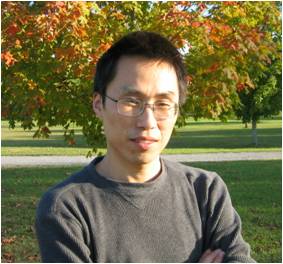 Dr. Kai Xiao received his BSc degree in Chemistry from the East China Institute of Technology, MS degree in Material Sciences from the Institute of Metal Research, Chinese Academy of Sciences in 2001 and PhD degree in Physical Chemistry from the Institute of Chemistry, Chinese Academy of Sciences (ICCAS) in 2004 for his work on organic and molecular electronics under the supervision of Prof. Yunqi Liu and Prof. Daoben Zhu. He worked as a postdoctoral research associate from 2005-2008 at the Oak Ridge National Laboratory (ORNL). Then he was employed as a research staff scientist at the Center for Nanophase Materials Sciences (CNMS) of Oak Ridge National Laboratory. Since 2011, he became a joint faculty of Department of Electrical Engineering and Computer Sciences at University of Tennessee at Knoxville. His current research focuses on conjugated polymers, molecular materials, and nanomaterials in optoelectronic device applications.
Dr. Kai Xiao received his BSc degree in Chemistry from the East China Institute of Technology, MS degree in Material Sciences from the Institute of Metal Research, Chinese Academy of Sciences in 2001 and PhD degree in Physical Chemistry from the Institute of Chemistry, Chinese Academy of Sciences (ICCAS) in 2004 for his work on organic and molecular electronics under the supervision of Prof. Yunqi Liu and Prof. Daoben Zhu. He worked as a postdoctoral research associate from 2005-2008 at the Oak Ridge National Laboratory (ORNL). Then he was employed as a research staff scientist at the Center for Nanophase Materials Sciences (CNMS) of Oak Ridge National Laboratory. Since 2011, he became a joint faculty of Department of Electrical Engineering and Computer Sciences at University of Tennessee at Knoxville. His current research focuses on conjugated polymers, molecular materials, and nanomaterials in optoelectronic device applications.
Details of his research activities can be found at: http://cnms.ornl.gov/contact_us/XIAO_Kai.pdf and http://www.eecs.utk.edu/people/faculty/kxiao.
What was your inspiration in becoming a chemist?
Actually I have to say I was not very much interested in chemistry in high school. When I was assigned to department of chemical engineering in college, I started to realize the chemistry is a fascinating field and I was attracted by those interesting chemical experiments to synthesize new materials. However, I was not really steeped in the chemistry research until I started my Phd in the Institute of Chemistry, Chinese Academy of Sciences. During that period, the excellent research environment in multi-chemistry fields allows me playing and applying small molecular semiconductors and conducting polymers in low-cost, flexible organic electronics.
What was the motivation to write your Polymer Chemistry article?
Most conducting polymers used in organic electronics utilize organic solvents such as chloroform and chlorobenzene. The toxicity of these solvents to people and the environment complicates and increases the cost of organic electronic device processing, undermining the goal of low-cost approaches towards renewable energy harvesting and storage. Therefore, we synthesized a non-ionic, water-soluble poly(thiophene) (PT) derivative for organic field-effect transistors. We believe that the combination of environment-friendly solvents and solution-based processing for the conducting polymers will open up the new opportunities for true low-cost, flexible, and green organic electronic devices that include OFETs, OPVs and biosensors.
Why did you choose Polymer Chemistry to publish your work? (DOI:10.1039/C2PY21020G)
Polymer Chemistry is a very exciting new journal, which is publishing high quality polymer science with a broad audience. It also has a very quick review and publication process.
In which upcoming conferences may our readers meet you?
2013 MRS spring conference
How do you spend your spare times?
With my family (wife, 7 year old daughter and 5 year old son), playing basketball, Pingpong, and swimming.
Which profession would you choose if you were not a scientist?
Probably be a doctor.
Cyrille Boyer is a guest web-writer for Polymer Chemistry. He is currently a Senior Lecturer and an ARC-Future Fellow at the Australian Centre for NanoMedicine (School of Chemical Engineering, University of New South Wales (Australia)).










